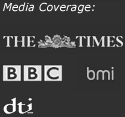Google dominance hits small businesses
17th Sep 2008
Has Google's dominance of on-line advertising eliminated healthy competition and left customers at it's mercy.
Many small businesses depend on advertising their goods or services on Google's search results pages. Search for instance for holiday cottages and apart from the natural results that appear in the middle of the page, there will also be adverts that people have paid Google for along the right-hand side.
This is what has driven Google's annual revenue to 6.6 billion dollars (annual report - 2007). Google is doing well. So well that with it's recent acquisition of the other large player in on-line advertising, Doubleclick, it now owns 70% of all on-line advertising revenue.
Worrying as that is, that's not the main concern. It is Google's dominance in the search engine market that causes most concern. In the UK Google has 87% of all searches. The next closest competitor is Yahoo with just 3.37% (Hitwise - August 2008). But guess what, Google intends to buy Yahoo. So what is that going to do to any idea of competition for your search advertising spend?
Oh and by the way, just in case you were thinking of advertising directly on popular websites, Google now also owns the giant social networking site, Facebook and the popular video website, Youtube.
I've always liked Google, with it's quirky logos and simple design, but recently I was hit by an Internet scam that froze my Google ads. Since Google were extremely slow to respond in remedying the situation, I had a look to see what alternatives there were. That's when I realised that Google had me over a barrel. There was no other meaningful competitor to Google that I could go to.
Now Google started out like many young companies with idealistic intentions, their motto is "Do no evil". But as companies get bigger and more successful, complacency and arrogance can creep in. When that is combined with a market domination that leaves no competition for your business, a very dangerous situation develops.
The USA government is examining whether the take over of Yahoo may result in uncompetitive practices and the European Union is launching an antitrust “inquiry” into the deal. Remember though, that all that does is to potentially reduce Google's dominance back to the existing 87% in the UK.
Just like the original antitrust breakup of AT&T and the more recent investigations into Microsoft, it may be time to consider if having such a dominant position, with little alternative competition for your business, is healthy. It may indeed be time to put in place legislation to break up Google's domination of such a key market.
Lawrence Gilbert
www.companypartners.com




